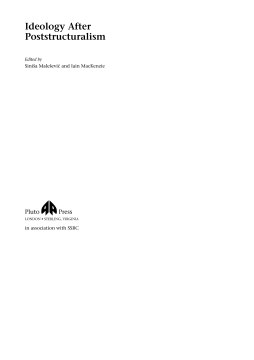
Additional Information
Book Details
Abstract
Ideology is a hotly disputed term in social and political theory. It continues to generate intellectual dispute more than 200 years after its birth in the fervour of the French Revolution. Most recently, post-structuralists such as Foucault and Deleuze launched a strident critique claiming that 'there is no such thing as ideology', creating a theoretical environment which polarises critical opinion either for or against ideology.
Ideology after Poststructuralism aims to end this culture of antagonism by bringing together leading scholars in the field to establish a dialogue between post-structuralism and ideology critique. For the post-structuralists there is a need to generate a sensitive account of ideology so as to bolster their claim that they have a significant contribution to make to social and political criticism.
For the ideology theorists there is a need to engage with the post-structuralist critique of ideology without taking the assumptions that post-structuralists have so thoroughly criticised. The essays in this book show how the intellectual posturing of recent decades has closed off debate to the detriment of both post-structuralism and ideology critique.
Table of Contents
| Section Title | Page | Action | Price |
|---|---|---|---|
| Contents | iii | ||
| Acknowledgement | vii | ||
| Introduction: de Tracy's Legacy | 1 | ||
| REFERENCES | 8 | ||
| PART I: Poststructuralism vs. Ideology | 9 | ||
| 1. Idea, Event, Ideology | 11 | ||
| IDEA | 13 | ||
| EVENT | 18 | ||
| IDEOLOGY | 22 | ||
| REFERENCES | 27 | ||
| 2. Ideology and Imaginary: Returning to Althusser | 28 | ||
| IDEOLOGY AND SCIENCE | 30 | ||
| IDEOLOGY AND IMAGINARY | 35 | ||
| IDEOLOGY AND (ALEATORY) MATERIALISM | 39 | ||
| REFERENCES | 41 | ||
| 3. A World Beyond Ideology? Strains in Slavoj Zizek's Ideology Critique | 43 | ||
| IDEOLOGY CRITIQUE AND NEGATIVITY | 45 | ||
| IDEOLOGY CRITIQUE AND THE AFFIRMATION OF ETHICS | 54 | ||
| CONCLUSION | 59 | ||
| REFERENCES | 62 | ||
| 4. City Life and the Conditions of Possibility of an Ideology-Proof Subject: Simmel, Benjamin and Joyce on Ber | 64 | ||
| NOTES AND REFERENCES | 83 | ||
| PART II: Ideology vs. Poststructuralism | 85 | ||
| 5. Rehabilitating Ideology after Poststructuralism | 87 | ||
| STRUCTURALIST APPROACHES TO IDEOLOGY | 88 | ||
| POSTSTRUCTURALISM AND IDEOLOGY | 92 | ||
| IDEOLOGY AFTER POSTSTRUCTURALISM | 98 | ||
| CONCLUSION | 108 | ||
| NOTES | 108 | ||
| REFERENCES | 109 | ||
| 6. The Dialectics of the Real | 111 | ||
| THE CASE AGAINST IDEOLOGY | 113 | ||
| PHILOSOPHIES IN THE NEGATIVE | 119 | ||
| THE TRUE AND THE REAL | 121 | ||
| DIALECTICS:THE REAL,THE TOTALITY AND THE CRITICAL METHOD | 127 | ||
| NOTES | 132 | ||
| REFERENCES | 133 | ||
| 7. Ideology, Language and Discursive Psychology | 134 | ||
| THREE PSYCHOLOGICAL LEVELS | 135 | ||
| THE NATURE OF THINKING | 136 | ||
| THE STUDY OF THINKING | 139 | ||
| RHETORIC AND COMMONPLACES | 141 | ||
| RHETORICAL ROUTINES | 143 | ||
| UNCONSCIOUS REPRESSION | 145 | ||
| CONVERSATION AND PRACTICAL MORALITY | 146 | ||
| FREUD’S CASES | 149 | ||
| SEXUALITY, POLITENESS AND DORA | 150 | ||
| REFERENCES | 154 | ||
| 8. The Birth of the Subject and the Use of Truth: Foucault and Social Critique | 157 | ||
| NOTES & REFERENCES | 169 | ||
| Notes on Contributors | 171 | ||
| Index | 173 | ||
| Adorno, Theodor, | 128 |
